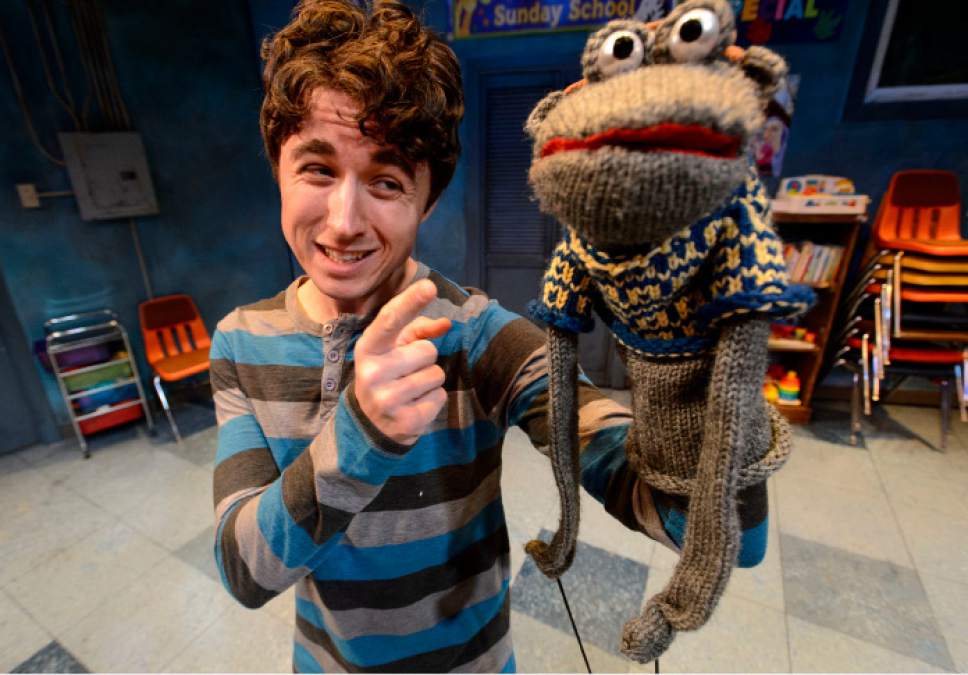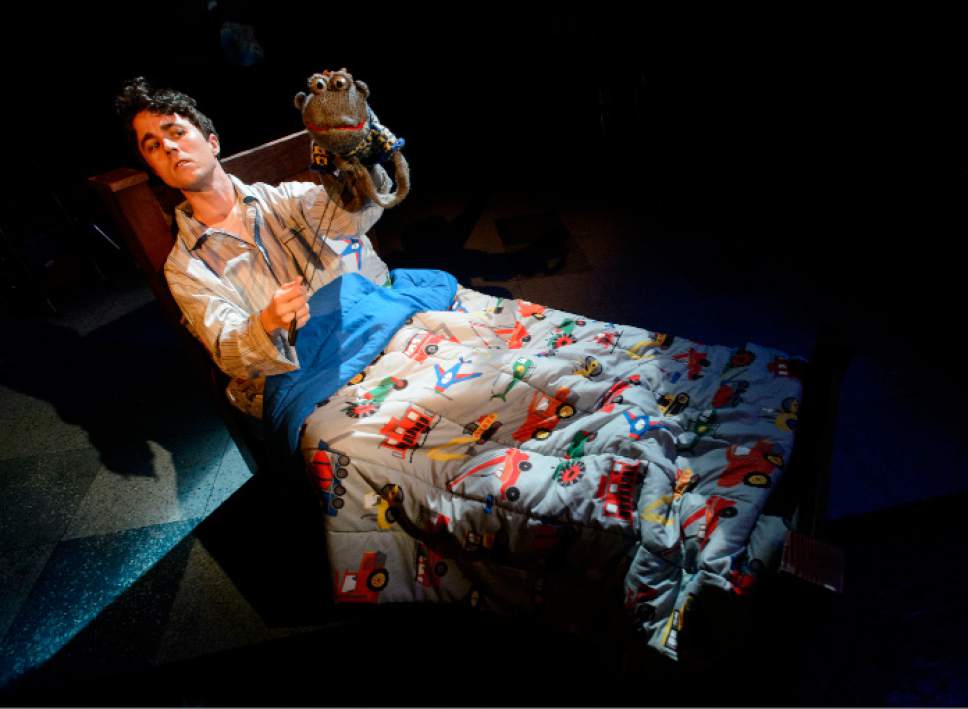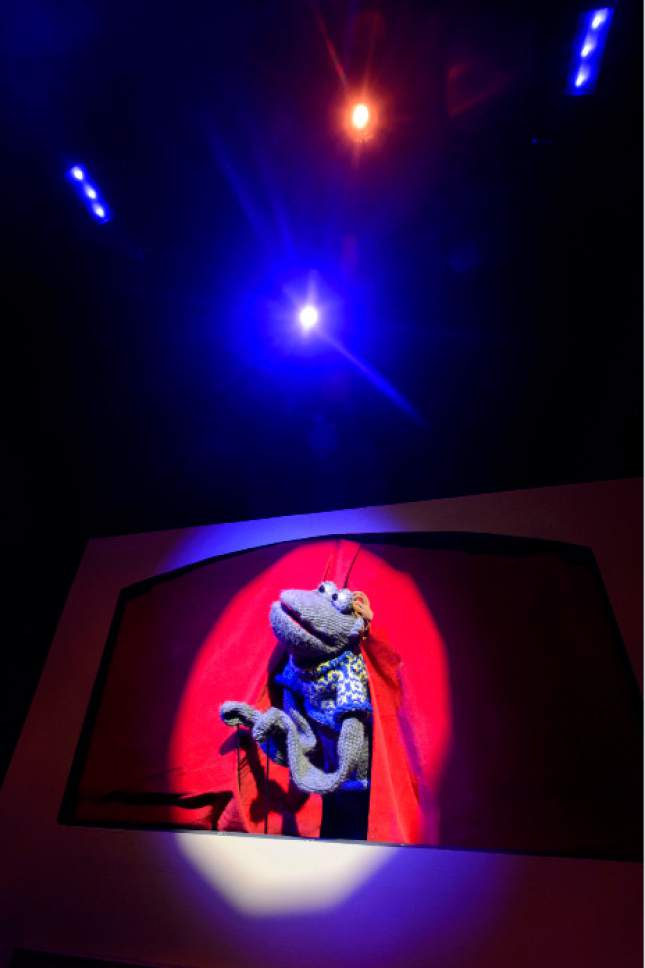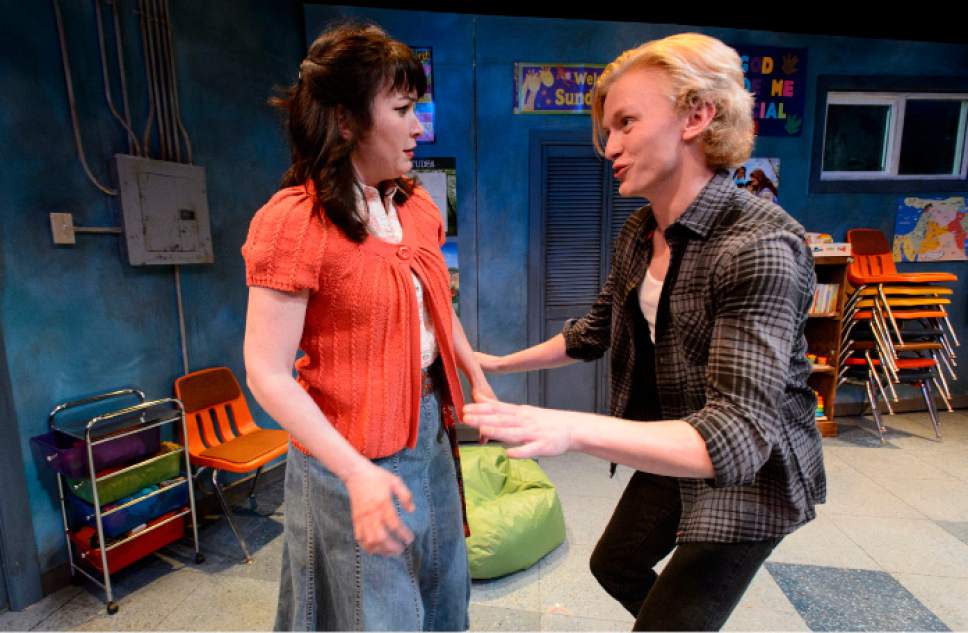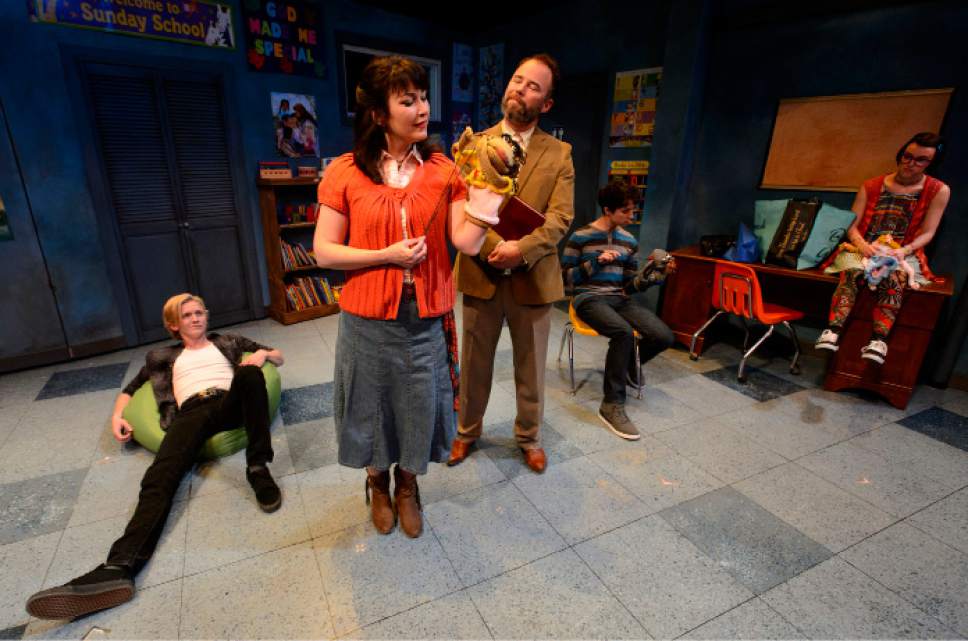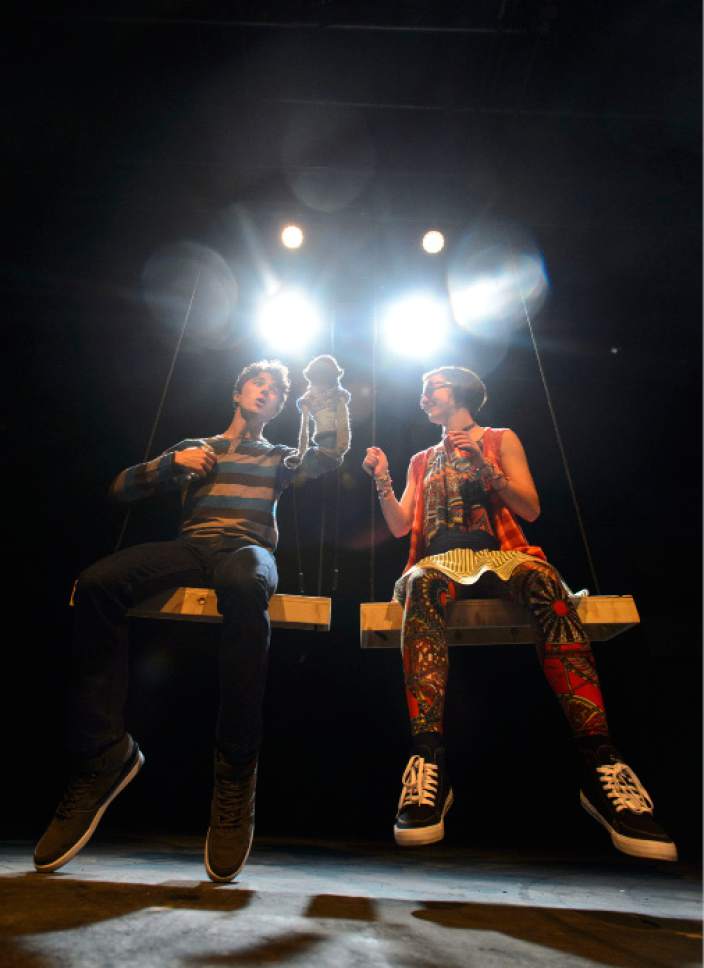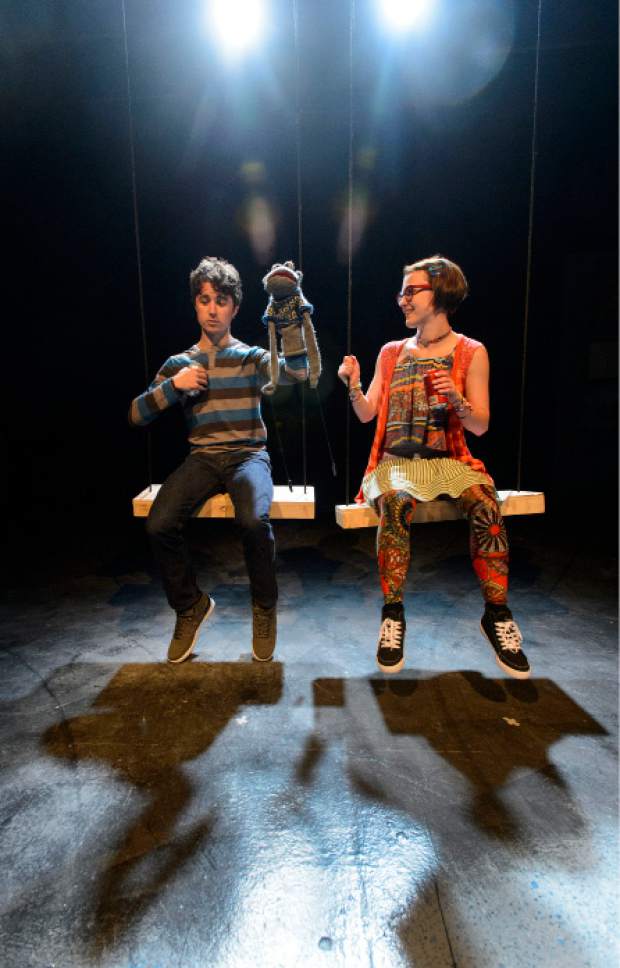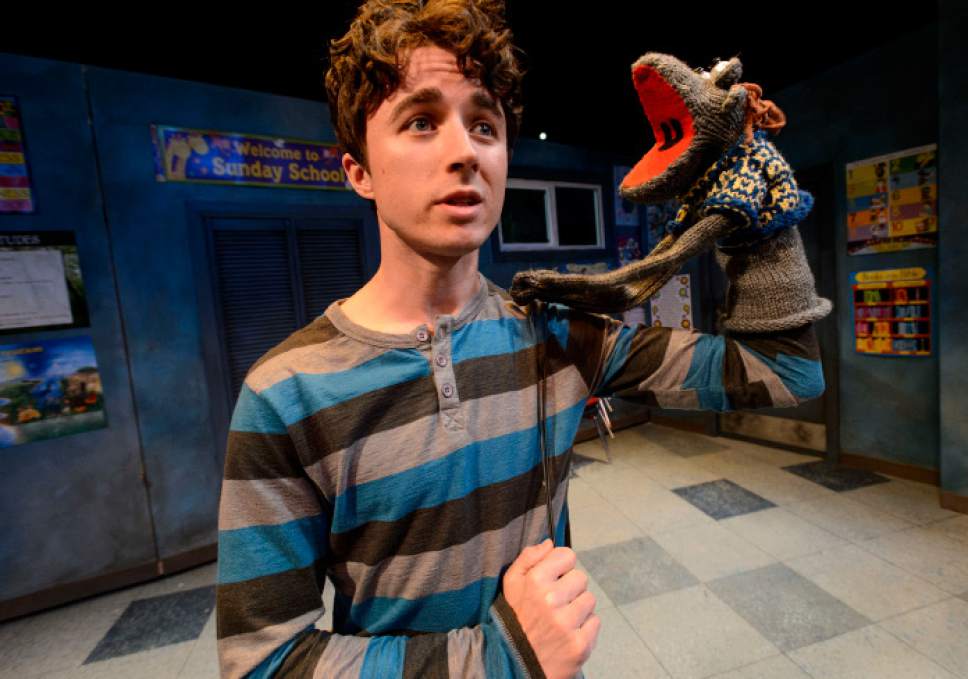This is an archived article that was published on sltrib.com in 2017, and information in the article may be outdated. It is provided only for personal research purposes and may not be reprinted.
Growing up in suburban Texas, Robert Askins recalls a few brushes with puppets.
There was a particular therapy puppet, a dolphin named Duso, that a counselor employed when he was held back between kindergarten and first grade.
Then there was the youth puppet ministry his mother oversaw at the family's conservative Lutheran church. Askins had already learned that performing solos with the children's choir earned him the kind of attention he craved. So he threw in with his mother, performing puppet shows for kids at vacation Bible camps, stories the playwright now describes as poorly written attempts to bring children to Jesus.
"Puppets are weird," says the 36-year-old playwright in a phone interview after lunching at the Brooklyn bar where he was working when his weird puppet comedy, "Hand to God," opened on Broadway in 2015. "The puppet in American culture is pretty much just the Muppets and therapy puppets and Jesus puppets."
Now his profane, provocative comedy featuring a puppet that might be considered something of an anti-Christ is on another kind of improbable journey; with 13 productions slated at regional theaters across the country, it has become the season's most-produced new play.
Salt Lake Acting Company will introduce the play to Utah beginning Wednesday in a production directed by Chris DuVal, an assistant professor of theater at the University of Utah and resident fight director at Pioneer Theatre Company.
"Hand to God" raises questions about the contrasting darkness and light in flawed humans who happen to be Christians. The twisted comedy opens with a monologue from a foul-mouthed sock puppet named Tyrone, who lives on the arm of Jason (Riley O'Toole), the trying-to-be-supportive son of his church-lady mom, Marjorie (Andra Harbold), who's grieving her husband's death. She's trying to hold things together as she oversees a youth puppet ministry on assignment from the lonely-hearted Pastor Greg (Dan Beecher).
When Tyrone expresses Jason's innermost sexual desires to Jessica (Amy Ware), another teen in the troupe, the story twists outrageously out of control. What promoters refer to as a "hysterical romp to hell and back" includes an attempted exorcism and an extended puppet sex scene.
The New York Times' Michael Paulson called "Hand to God" a "dark comedy with the can-puppets-really-do-that raunchiness of 'Avenue Q' and can-people-really-say-that outrageousness of 'The Book of Mormon.' " "When 'Sesame Street' meets 'The Exorcist' " was the headline of Michael Schulman's New Yorker review.
For all the "South Park"-style profanity, especially in the mouth of its leading puppet, the play's tone is unusual in the way it values the beliefs of its religious characters, even as they are unraveling.
"The shock of the play, and the empathy of the play, is such a weird mix," Harbold says. "All these people are sort of dropping their lights and saying: 'OK. Where did I put it? Where do I find it again?' "
As the play has received productions across the country, it has created a meaty lead role for an ambitious young actor willing to learn puppetry skills. "When the play functions at its optimal efficiency, at its most effective, you forget that Tyrone is on the kid's arm," Askins says, describing the challenge this way: "Here's a sock. Show us what you can do."
The role requires the math, or precise choreography, of comedy, O'Toole says. In playing the dual roles of Jason and the puppet, the actor is called upon to be his own scene partner. "The timing of where I'm looking and where he's looking has to be very specific," he says.
The character of Marjorie showcases a female actor whose apparent niceness is subsumed by her character's need to prove she's alive. In general, the actor cast in the part is one of the local theater scene's favorites, the kind of performer likely to have already taken on both female roles in plays like "The Glass Menagerie," Askins says.
"I've been good for so long, and it's just not paying off," is one of Marjorie's lines before she explodes in sexual aggression that is as inappropriate as it is honest. "She's desperately trying to be a good person and trying to protect her son, and she ends up getting it all wrong," Harbold says.
Harbold calls herself a person who's easily embarrassed, which makes her appreciate the irony of embodying a character who is, at least temporarily, shameless.
Before writing "Hand to God," Askins says he spent about a decade struggling to write existential Western plays, stories that weren't attracting much interest. But in a one-act play, "Matthew and the Pastor's Wife," he drew upon the complicated Christians he knew growing up in Texas.
In 2010, a New York Times reviewer called it "a tasty tale of lust and salvation." After a cast party, Askins felt compelled to go home and write more roles for the show's actors.
He conceived a love triangle between a pastor, a mother and her son's friend, and somehow, what also bubbled to the surface were memories from his church puppet days. He began writing a monologue in the voice of a teen boy's puppet, Tyrone, and the play "kinda just poured out," the playwright says. "It wasn't easy to write, but it sure wasn't difficult. It wanted to be, and then it was."
Askins says he values the complexity of Chekhov and the poetry of Shakespeare, but believes the American theater of our era is hungry for sharp comedy. "I'm crude and I think a lot about theology," he says. "I have certain preoccupations and hangups, and I want you to understand them badly enough to take up one hour and 45 minutes of your time, with intermission."
He spent five years rewriting and shaping "Hand to God" through two productions in off-off- and off-Broadway theaters, until in 2015 the comedy became one of the season's most improbable Broadway shows. Until the opening curtain on Broadway, Askins says he kept reworking and rewriting the last scene. The actors tried to convince him the play was finished, yet the playwright wasn't yet satisfied with the reconciliation scene.
The ending of what he calls his "rowdy comedy" required a delicate touch, as the story "swerves all over the place tonewise," the playwright says. "It's goes from being dark to being funny to being perverse to being moral. You can't shake a decade's worth of writing existential Westerns when you try to write your first comedy."
facebook.com/ellen.weist —
'Hand to God'
Robert Askins' play about a nasty puppet and the boy whose arm he lives on, who question the idea of God. The show is directed by Chris DuVal, with set design by Gage Williams, costume design by Philip R. Lowe, lighting design by James M. Craig, sound design and composer Jennifer Jackson, and puppet design by Steven Glenn Brown and Linda L. Brown
When • Previews April 12-13; opens April 14 and continues through May 14; 7:30 p.m. Wednesday-Saturday, 1 and 6 p.m. Sunday
Additional shows • 7:30 p.m. Tuesday, May 2; 2 p.m. Saturday, May 13
Where • Salt Lake Acting Company, 168 W. 500 North, Salt Lake City
Tickets • $15-$42, depending on performance; (student, senior and 30 and under discounts) at 801-363-7522 and saltlakeactingcompany.org
Playwright's visit • As past of an opening weekend visit, Askins will meet local university students, attend a staged reading of his new play "The Squirrels," and meet Utah-based playwrights. The visit is sponsored by the Dramatists Guild Fund's Traveling Masters program, its first events in Utah. Contact SLAC for event information.


